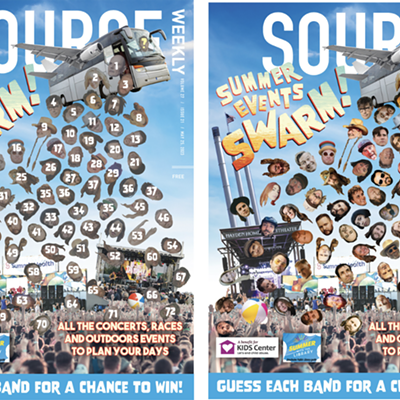NOTE: Three weeks ago, we provided two prompts for micro-short stories. We were thrilled, entertained and puzzled by the entries. We provided two separate one line prompts to jump start your stories, and told you to keep it within 250 words—a challenging order— to write complete stories with dynamic characters and detailed settings in the space of what would probably take one minute to read.
Most of the stories riffed one of the two prompts: "I wasn't sure how, and when, to tell him that his poetry was bad. I mean, really terrible." From this single line, writers took the idea in so many different directions—from a cell block in 1930s Alcatraz to futuristic sci-fi, and several bad poetry reasons in-between.
The resulting stories were good, weird and, once again, entertaining.
Over two days, our editorial staff whittled entries down to 10 final stories to present to our esteemed judges—Dr. Emily Carr, Director of Oregon State-Cascades Low Residency Master of Fine Arts in Creative Writing; and Mary Heather Noble, Programs Director at Nature of Words.
Here are this year's winning entries.
THE WINNER!
Our judges remarked on how much they each liked the intentional and unique choices of words and, throughout the story, clever pacing and punctuation—pacing and punctuation done for a purpose, not just an effect. Like, the final few lines that unfold the simple action of lighting a cigarette slowly and sparsely. The judges also liked that, in general, the story follows the cardinal rule: show, don't tell! Let details and actions show the character, as opposed to telling the reader what or who the character is. And yes, humor helps.
[untitled]
I wasn't sure how, and when, to tell him that his poetry was bad. I mean, really terrible. He continued to write with, what seemed, reckless abandon.
He contended that his poetry was straight from the heart, observations in time, honoring a form from long ago. His "art" was born from sweat, thirst, hunger, and pure suffering...his thoughts pounded the paper in rhythmic movements.
Ode to Wing Ridge
I will kill Peter
He carried so many beers
His purpose served
To me, this is not "poetry"...this is the material that ends up on a napkin in some bar, in some yurt journal, on the sands of a playa.
"Ode to Jason"
Where's my club soda?
Mennonite getting crazy
Burnt my testicles
"Enough!" I have to say something. I waited for the a.m.
The next morning appeared through a listless night of word finding.
"Honey," I said. "We need to talk."
I'm sure the tension in my voice was palpable.
"It's about your poetry...it just...it just really sucks. It's immature, it's meaningless, it's not even that funny."
There was a long moment of silence.
He struck a match.
Lit a cigarette.
Inhaled.
Looked up.
Mumbled.... "Unicorn dreams smashed,
Can you please pass the coffee,
Sweet rainbow sister."
By Eric B
Runner-up:
[untitled]
I wasn't sure how, and when, to tell him that his poetry was bad. I mean really terrible. He had it stuck in his head that poems had to rhyme. Even so, his limericks where horrifying. I explained to him that poems didn't have to rhyme, and there are different types of poems than limericks. However, all he did was write a 'poem' about me:
There once was a girl from Loems,
Who couldn't stop talking 'bout poems,
She was always naggin',
Her teeth were a-waggin'
And this is the one way to slow 'em.
I mean, teeth don't wag, and there is NO such place as Loems. However, he is getting great grades in English. He even won the school-wide poetry contest, for being 'original'. No surprise there. He wouldn't come over and watch Star Wars; he's still trying to hone his poetry skills. Instead, he wrote another poem about me:
There once was a girl named Taylor,
Who loved her VHS player
She'd sit down and scream
When Vader was creamed
I'm still trying out my new prayer
(For Taylor)
Not bad.
Today I finally told him that his poems were terrible. And he told me that I didn't know what good poetry was. I told him that because I'm the Quisatz Haderach, I do. Nevertheless, he stormed off and went to class. Good thing we have different classes for the rest of the day.
By: Vinna Ottaviano, Age: 11
HONORABLE MENTION (a tie!)
[untitled]
I wasn't sure how, and when, to tell him that his poetry was bad. I mean, really terrible. I pondered my dilemma as I walked. I wanted to tell him in person, and in front of Peggy, but wondered what approach would make Craig look worse: me being sympathetic yet condescending, or me just going balls out and eviscerating the bastard.
My body gave an involuntary shudder of pleasure at that last thought.
Fellow student Craig had been the bane of my existence for months, interfering with my attempts to date Peggy.
"I can't go out," Peggy would say to me. "Craig's helping me study again."
But now that Mr. I'm-A-Gorgeous-Genius had tiptoed into my major and asked me to evaluate his poetry, it was time to take the scumbag down several notches.
I strolled into the café to see Peggy and Craig sitting together. I decided his poetry evaluation should occur now.
"Got your email, Craig," I said, sitting, "and your poems literally gave me painful spasms within minutes, making your poetry comparable to a bad case of food poisoning."
I smirked, but something was wrong. Did I see the beginnings of a smile forming around his lips? And Peggy, why was she looking so angry and- ah . . .
His email sought my opinion, but never stated who wrote the poems.
I looked him in the eye as Peggy's face grew redder, took a deep breath, and gave him a nod.
Well played, sir. Well played.
By H Downing-Barrier
General Shakespeare
I wasn't sure how, and when, to tell him that his poetry was bad. I mean, really terrible. The afternoon sun punched through the office windows, making his golden epaulettes glint and hid his jowly, expansive face in shadow. His mustache, a perfect rectangle, sat in geometric opposition to the uneven oval of his mouth as it formed itself around his ridiculous rhymes.
I was the most recent in a long string of chiefs of staff to the Generalissimo. Something of a hot seat, this job. Some of us had died in prison. Some shot ceremonially or unceremonially depending on his mood. One, famously, simply dropped dead of fear right here on the cold marble office floor when questioned directly about a crop failure.
And now, our Great Leader had decided to take up poetry. He'd had a bloodline concocted to the Bard himself through a rather fantastic tale of Elizabethan procreation, overseas exploration, pirate capture, enslavement and triumph across an equally fantastically brief timeline. Through fear, awe and triumph of the will, the teeming populace truly believed him the grandson of Shakespeare and the son of God.
And here I sat, across an oak desk large enough to accommodate a helicopter, asked for my honest opinion of his latest poem; a tribute to the tireless farmers in our agricultural lowlands. Knowing those poor farmers would be tortured and slowly killed for their spastic laughter at the ridiculous verses just read to me, I felt I had a duty.
By Karsten Hagen
And, one more. . . an editorial pick: Perhaps because it is near Halloween, but this one was a favorite with the editorial staff.
Close Call
I wasn't sure how, and when, to tell him that his poetry was bad. I mean, really terrible. That's not what one does to a werewolf that shows up at your editing office. Especially on a chill winter evening with the full moon due to appear-- my watch said 4:55-- terrifyingly soon.
"Sir," I said to the hopeful, sharp-featured face currently sprouting hair surreptitiously under his polo shirt, "I'm afraid this just... isn't for us." I held my breath.
It was worse than I feared. His heavy brows drew to a confused "v" over deep-set eyes. "B-but why? I worked on it so hard." Tears threatened to spill over the rapidly growing stubble on his cheekbones.
I strained to think of how best to explain. "Uh, Josh, there is no structure to your poem. It doesn't have to rhyme, or anything, but it needs something. And the subject material? Nobody wants to read about dripping raw meat." The look on his face was exactly like I'd whipped a puppy. I almost wanted to see if a tail had sprouted to go between his legs. "It's just not for us."
At that moment, the puppy turned into a big dog. Josh's shoulders went from slumped to burly, his chest from concave to massive. He leapt up. "Fine! I don't need you anyway," he growled, and pushed past my crowded desk to outside.
I shut the door. Looking back, a wiry hair curled on my visitor chair.
By Jennifer Chambers























